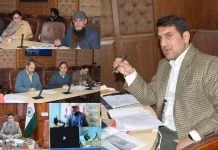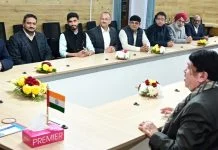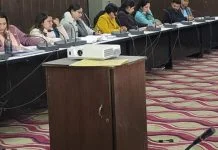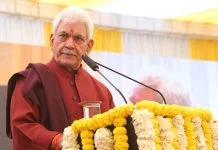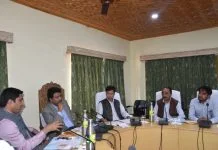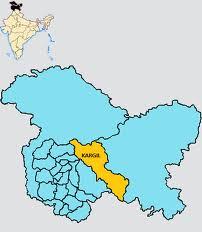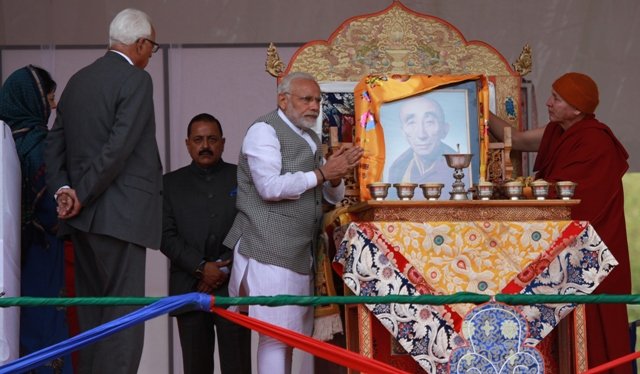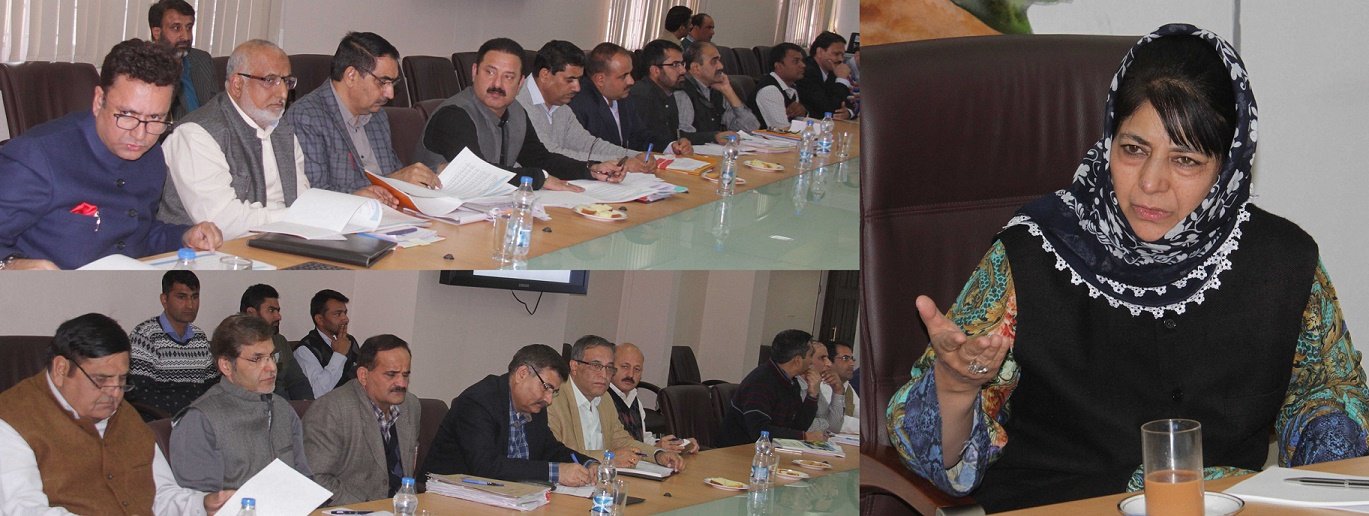
Chief Minister, Ms Mehbooba Mufti, Monday chaired a meeting to review the functioning of Food, Civil Supplies & Consumer Affairs Department and implementation of Electronic Public Distribution System (ePDS) project in Jammu and Kashmir.
Appreciating the FCS&CA Department for its performance in ensuring uninterrupted supply of ration to the consumers even during the difficult prevailing situation in the Kashmir, the Chief Minister underscored the importance of PDS in ensuring availability of food-grains to the public at affordable prices, enhancing the food security and serving as a safety net for the poor.
Minister for Food, Civil Supplies and Consumer Affairs, Chowdhary Zulfkar Ali, Financial Commissioner Planning and Principal Secretary to CM, B B Vyas, Secretary, FCS&CA, Shafiq Ahmed Raina, Secretary, Information Technology and Technical Education, Mohammad Saleem Shishgar, Directors, FCS &CA, Kashmir, Tasaduq Jeelani and Jammu G S Chib besides other senior officers were also present in the meeting.
During the meeting, Minister for FCS&CA presented a detailed overview of the functioning of the department. Presenting a comparative view of the old PDS and NFSA, the Minister said that under NFSA around 120 lakh souls are being covered as against only 99 lakh souls under the old system. He said close to 75 lakh souls out of the 120 lakh are provided ration at Rs 2 and Rs 3 under PHH category. The remaining 45 lakh souls are provided ration at Rs 8 and Rs 10 under non-PHH category.
The Minister further informed that after implementation of NFSA in J&K, State Government launched Mufti Muhammad Sayeed Food Entitlement Scheme (MMFSES) with effect from 1st July 2016 to supplement NFSA. Under MMFSES, the State Government provides additional 5 Kg of food-grains per soul over and above the NFSA scale to BPL, PHH and NPHH subject to maximum of 35 kgs per family.
The Minister enumerated some of the major steps taken by the department for bringing transparency and streamlining the entire food-grain distribution chain including issuance of fresh ration cards, digitization of data, sanctioning of 4388 new Fair Price Shops, introduction of electronic weighing scales, linking ration tickets with Aadhaar, tracking made mandatory through GPS installed on commodities transporting vehicles, toll free helpline no 1967, vigilance and monitoring committees constituted at village level to monitor distribution of food-grains/K-oil among others, quarterly issuance of food-grains.
The Minister also highlighted that following the Chief Minister’s intervention, the department was able to take over the store from FCI at Nagrota with a storage capacity of 5000 MT after 45 years with 95 kanals of land.
The Minister also apprised the Chief Minister with regard to status of Oil products sector and various issues pertaining to the department.
The Chief Minister sought status regarding shifting of food depots from the core are of the Srinagar city to some other location on the periphery to help decongest the area.
During the meeting the Chief Minister was also given a detailed presentation on the ePDS implementation in the State by Oasys executives. It was informed that implementation of ePDS in the state will guarantee food security for the vulnerable and poor, deliver higher quality of services to citizens, accountability and traceability and entire management online.
The Chief Minister noted that manual processes related to PDS operations especially at the Fair Price Shops (FPS) level leads to diversions as it is difficult to monitor actual sale at this level in a transparent manner.
The Chief Minister observed that the solution lies in ePDS through end to end computerization so as to have complete transparency and accountability in allocation of commodities to shops and tracking distribution against allocation.
Various ePDS process models under implementation in states like Uttar Pradesh, Maharashtra, Tamil Nadu and Himachal Pradesh were analyzed. It was informed FPS automation involves installation of Point of Sale (PoS) device at the FPS which will be linked with beneficiary Aadhaar number and beneficiary biometrics like finger prints. The ration beneficiaries will also be provided with a Smart Ration Card having Unique Family Code (UFC).
The Chief Minister was briefed about online transaction through Aadhaar and OTP system, offline transaction through local ePDS database, billing compliance through SMS. They also gave out details about working of public portal for beneficiaries, G2G service by web portal, Integrations of DPC, FCI, Godowns and FPS, operations and maintenance and accountability system in the state.
It was given out that PoS shall remove manual intervention in the PDS supply chain. Through these devices the entire completed transaction involving commodity, quantity and price will be electronically registered on the central server and Management Information System (MIS). The MIS will be able to generate entire information with regard to state, district, shops and customer wise details of sales, stock, allocation, card holder, transactions, complaints and feedback.
ePDS implementation will also include public mobile app and a web portal that will serve to depict number of shops, their status, view chart and transaction details through one time password (OTP) utilization, stock status through SMS, new card and mutation facilities, and view grievance status.
It was decided that initially the system shall be implemented in 10 Fair Price Shops in the state on pilot basis.



